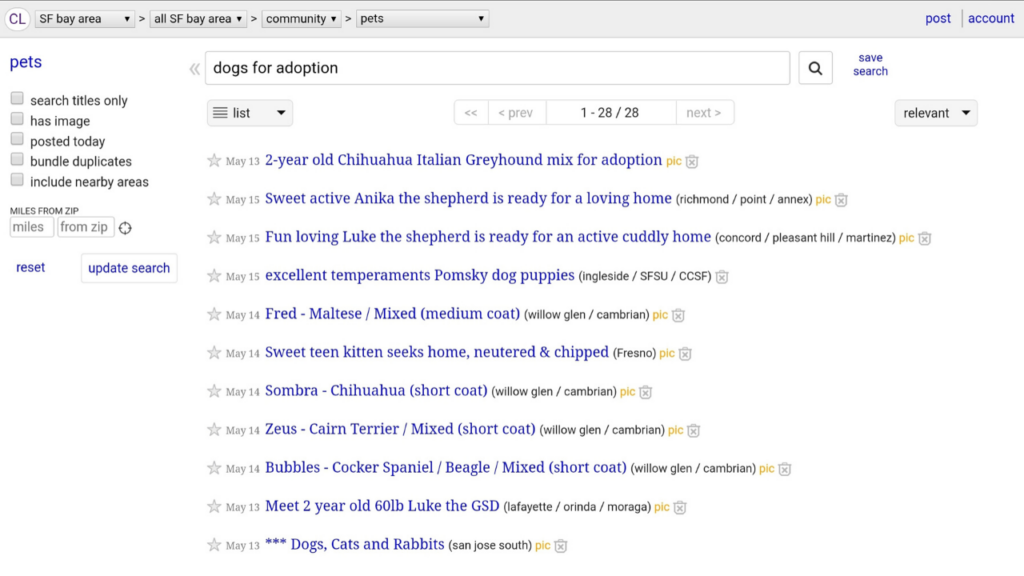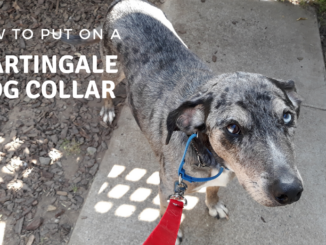
Do you need to give up your dog? Here are six surrender and non-surrender options and the pros and cons of each.
Every year, millions of dogs are rehomed for a variety of reasons. No one gets a dog intending to give it up, but when life changes unexpectedly people are forced to make difficult decisions.
There are many reasons that someone might give up a dog. These include:
- Aggression
- Lack of training
- Can’t afford medical bills
- Can’t afford food
- Can’t find pet friendly housing
- Job loss
- Conflict with house mates
There are a number of options when surrender becomes a necessity. These include:
- Surrender to a shelter
- Surrender to a rescue group
- Give the dog to someone you know
- Give the dog to a stranger via Craigslist etc.
- Work out the issue
- Euthanize the dog (put to sleep)
There are pros and cons to every option which should be considered before making a decision. Here is a breakdown of the six possibilities listed and what you should know about each.
1. Animal Shelter
Surrendering your dog to an animal shelter can be a viable option. In many cases, it is quick and easy. While progressive shelters are developing more comprehensive surrender programs that include appointments, counseling, and support, in many you can still just walk in and drop off a dog at any time. For a (usually nominal) fee, you can surrender your dog the same day, often without regard to the animal’s history. The dog will be housed, cared for, given medical attention, and placed up for adoption in a facility accessible to the public.
If you are desperate or have waited till the last minute, this may seem like a good idea, but there are significant consequences to be aware of. For one, there is no guarantee of adoption. Shelters vary widely in their quality of care and service, and there are many variables like where it is located, how many animals they take in on a regular basis, and what staffing and financial resources they have to address medical and behavioral issues.

Some shelters euthanize animals for space, so even healthy friendly dogs may be put to sleep to ease overcrowded conditions. In a shelter with many available dogs and few potential adopters, those dogs that are less adoptable because they are old, unfriendly, or have a medical condition may suffer the same fate.
Dogs can sit in adoptions for weeks, months, or even years in some shelters that do not understand the futility of “warehousing” animals. if adopted, the adoption may not work out, and the dog may be returned to sit in a kennel even longer. So surrendering to a shelter can be quick and can have a good outcome, but there are no guarantees, and once you sign the paperwork, you relinquish any rights. Should you change your mind later, you may not have the option of taking your dog back.
2. Rescue Group
Rescue groups occasionally have a brick-and-mortar facility, but more often they are foster-based. This means that the pets in their care live in homes with temporary families readying them for adoption. This is ideal for providing a less stressful, more natural environment for a dog as well as for assessment and treatment of any medical or behavioral issues.
The foster system is positive in some ways, but a significant negative is lack of space. While a shelter may be able to house 100 dogs, a rescue group may only be able to take 5 or 10 dogs, depending on how many available foster homes they have at that time. Each dog must be adopted before another can be taken into the program, so even if the group is willing to help you there may be a wait for surrender. If your dog has issues, especially towards other dogs, they may not be able to help you, as most foster families have multiple dogs at a time.
While most rescues are reputable and do a great service for their communities, some are not so much. Every animal rescuer starts out with good intentions, but taking on too many animals can lead to hoarding. Lack of adoption opportunities, like infrequent pet fairs, can cause the problem to snowball out of control.

I unfortunately dealt with a number of such cases during my career in animal control, and they are awful to see. My dog Kaden, pictured with the title of this article and the accompanying video, came from such a place. He was emaciated and living with over 100 other dogs on a filthy property. You don’t want your dog to end up in a situation like that. Because of this possibility, do your homework before handing your dog over to any rescue group. Do an internet search on their history, check any online reviews, and ask around to make sure they have a good reputation.
As with the shelters, once you relinquish ownership of your dog to a rescue group, you give up any right to take him back should you change your mind. Rescues are notorious for not wanting to return surrendered or even found pets, so take this into consideration. If the situation driving you to give up your dog is temporary and there is a chance you will want him back, it may be best to pursue another avenue. Also as with the shelters, there is no guarantee of adoption.
3. Friend or relative
A less formal way of rehoming your dog is to give him away to a friend, relative, or anyone else you know personally. As a pet owner, you probably know others who have pets and can possibly take on another. They may live in pet friendly housing or own their own home. You can put your trust in someone you know, most of the time … watch my video to hear a story of how such trust was broken in one unfortunate situation.
If this is someone with whom you are in regular contact, you can keep tabs on your dog’s welfare and feel good knowing he is in a good home. Should your situation change, you may be able to take him back. If this is a possibility, be sure to be upfront with the new owner so they don’t get too attached. Current and former owners of pets can get into custody battles you wouldn’t believe!
4. Stranger
Another option is to give your dog to a stranger. Now I’ve known many people who got a dog or other pet from an ad on the internet (or in the old days, the newspaper) and it worked out just fine. By reaching out to the public, you open up a larger pool of potential adopters, many of whom could be sincere. The problem is, you don’t know what you’ll get.

Your dog’s adopter could be the greatest home ever, or they could be a lunatic or a flake. It’s a total crap shoot with the internet. You have no idea who these people are or what their intentions are. Another problem is that you will likely never see them or hear from them again, so you won’t know how your dog is doing or have a chance to take him back. Because of all the uncertainty, I wouldn’t recommend going this route unless you are desperate and all other possibilities have fallen through.
5. Work it out
Some of the issues driving an owner to surrender their dog can be resolved with a little support. Here are some resources to help you work through the problem instead of surrendering.
Training
Behavioral issues can often be eliminated or at least lessened with training. There are many schools and private trainers all around the country, so do an internet search for your area. You can also ask at your local shelter, dog walking group, or any other animal place for recommendations.

If you’re reading this during quarantine, don’t despair. Many trainers are offering consults and lessons via Zoom and other virtual platforms. It’s worth putting a call in to discuss your situation and see if the trainer can help you.
Vet Bills
There are some programs to appease the high cost of vet bills. Care Credit is a special credit card for health care that charges zero interest if the bill is paid off within a certain time period. This is a good option if you need quick money and you have a way of paying it back, at least in time. You may qualify for other borrowing options like a personal loan or credit card. Just beware of loans that require collateral like your car (run, don’t walk), payday loans (run faster), and high-interest credit cards.
There are some charities that offer grants from time to time for this purpose. Funds can be limited, so reach out to these organizations right away when you need help. You can also try your local churches, beneficial organizations, and any other group that may raise funds for charitable purposes.
Pet Food
Many shelters now have food pantries in recognition of the importance of keeping pets in their homes, even when owners are going through hard times. With high cost of living in many areas and unemployment at an all time high, many families are struggling to put food on the table, let alone in the dog’s bowl.
If you’re not already, become a frugal shopper. I do my best, but some folks are pros with the coupons, specials, clubs, and other ways of maximizing savings. There are many articles and videos online detailing ways you can do the same.
Pet Friendly Housing
Finding pet friendly housing can be tough, but there are options if you know where to look. There are a number of rental search sites listing pet friendly apartments and rental homes. Rents may be higher in such units and they may require extra security deposits, but if you can afford it it’s worth the peace of mind for a secure home.
You may be able to move in with friends or family, even if only on a temporary basis. Home sharing has its challenges but it can also be a positive experience. Living with family drama can be difficult but worth it if it enables you to keep your dog. If the situation is uncomfortable it at least buys you time to find more suitable housing.
Making your dog a service dog can facilitate finding pet friendly housing. In many cases, landlords cannot refuse to rent to a tenant with a service dog, even if pets are not normally allowed. This is a good idea even when you’re not looking for housing, as it opens doors not available to others. You can train your service dog yourself, but its worth a call to your local trainers to find out the best way to go about it.
If you are running out of time and can’t find a suitable place, there may be fostering options. Ask your local shelters and rescues if they know of any temporary free or cheap boarding for your dog. These programs are typicaly short term and favor folks most in need like those escaping domestic violence, but they can be a good option when all others fail.
Job Loss
If you have lost your job or are experiencing some other kind of hardship, the most important thing to do is to view it as a temporary setback. Things will get better in time and when they do, you may regret making permanent decisions like giving up your dog. Explore the options listed here to help you get through it. If your dog has to eat grocery store pet food (or your leftovers) and you have to eat ramen for a while, so be it. Don’t give up right away
Resolving conflict
This is going to sound super obvious, but the first step to take in resolving conflict is to talk about it. Maybe you’ve already tried this, but if not, please do. Too many people dont want to talk about anything, especially subjects which are uncomfortable or may cause arguments. Try. If it doesn’t work, at least you did all you could.
There may be steps you can take to mitigate your dog’s presence in the home if it is affecting others. For example, you could keep your dog in your room, partition off sections of the home with baby gates, or use a crate. If there are other dogs in the home that are not getting along with yours, you can rotate time out in common areas or the yard. Look at all the possibilities and try to rearrange things to minimize the problems that are occurring.
If things are not working out despite your efforts, it may be time to move, or your housemate(s) may need to move. Who does what depends on whose house it is, who owns the property or whose name is on the lease. This is a big change but worth it if you can keep your dog. How would you feel if you gave up your dog only to find that the conflict continued? Sometimes the problem isn’t the pets, it’s the people.
6. Euthanize (Put to Sleep)
I mention this option last because it should be your last resort … but it is an option. Obviously I don’t think it’s ethical to euthanize your dog simply becuse you don’t want him any more, and most vets will not do this, instead offering surrender alternatives. However, if your dog’s medical or behavioral issue is severe, it may not be an unfair choice.
If your dog is aggressive, has bitten people, attacked other dogs, or killed a cat, do you really want to hand this problem off to someone else? There is no farm where all these dogs can run free and live out their lives in a fantasy world. Most pet owners are just like you, with families, other pets, and life’s challenges.
While some mild aggression issues like leash reactivity and barrier frustration can be reduced or eliminated with training, more severe issues may never go away. Watch my video to hear the story of one such dog whose issues controlled his owner’s life for FIVE YEARS.
Consulting with a behaviorist can be helpful in making a euthanasia decision, but — and this is going to sound bad — beware of what they may tell you. No one wants to say, “Yes, euthanize your dog,” especially a trainer who believes they can fix the problem. You need to know what kind of a commitment is required to training and ongoing management, and if it is feasible for you and your family.
The aforementioned leash reactivity, barrier frustration, or fighting between dogs in the home can often be resolved or managed, but more severe issues may require your life to revolve around a dog who is dangerous. I was involved in one case in a shelter where a dog had some pretty severe behavioral AND medical issues. The shelter was going to euthanize, but the behaviorist stepped in and agreed to take the dog. That was a happy ending for all because he had the expertise, facility, and finances to deal with the problems. He also took on the liability.
There are worse fates than being humanely euthanized with a caring owner. This is not an unfair decision to make if all other options have been exhausted and/or your dog is dangerous.
Microchip Registration
When stray dogs are brought into animal shelters, they are scanned for a microchip. This enables the staff to contact the owner quickly so they can come down and reclaim. Unfortunately, up to 50% of these chips are not currently and correctly registered, delaying or preventing the owner reunion.
When you rehome your dog, it is critical that the microchip be registered to the new owner. A shelter or rescue should take care of this as part of their adoption process, but it is your responsibility when you privately rehome. Be sure to give the new owner the paperwork with the chip number on it so they can register. Even better, don’t rely on them, call the chip company yourself and inform them of the new owner. Watch this short video to learn how to do that.
No Judgment
Ultimately, it’s up to you to make the decision that is best for you, your family, and your dog. No one has the right to judge you unless they have walked in your shoes. Some people can be very righteous and claim they would live in their car before giving up a pet, but in reality they have probably never slept in a vehicle, much less lived in one as many sadly do. We all face challenging times in life and do our best to make difficult decisions. Understanding, support, and resources from friends, family, and others are a lot more helpful than judgment and negativity.





Be the first to comment